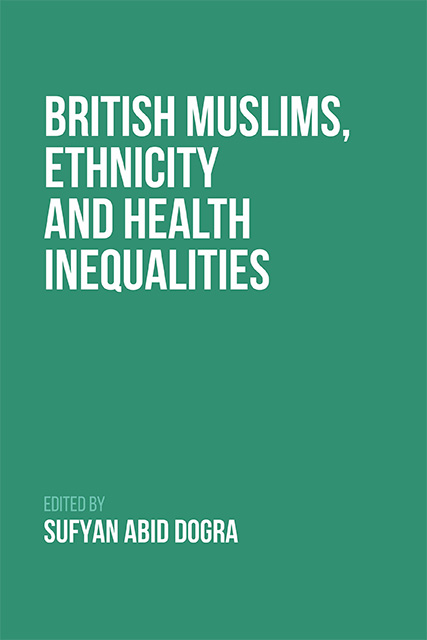18 - The Way Forward to Reduce Health Inequalities among British Muslims
Published online by Cambridge University Press: 18 October 2023
Summary
This book has discussed why British Muslims live with ill-health indicators and how they experience health inequalities in their daily lives. It has argued that the sociopolitical experience of being British Muslim and British Muslims’ religious identity can be wider determinants of health along with class, ethnicity, racism and deprivation. The book advocates a revision in the policy of delivering health promotion interventions and initiatives targeting high-risk groups. British Muslims live with multiple and multi-layered factors negatively affecting their health. We present the following recommendations to improve the health and wellbeing of British Muslims, ethnic minorities and people living with disadvantages in deprived neighbourhoods across the country.
1. A new perspective on involving people in the design and delivery of health promotion initiatives and interventions meaningfully is required. This renewed thinking among health practitioners, researchers and policy makers should involve an intersectional approach by acknowledging religion as a wider determinant of health for British Muslims along with ethnicity and social class, and consider factors like structural violence, discrimination, racism and Islamophobia, all of which affect ill-health experiences.
2. Applied health researchers, when developing and delivering health promotion interventions for marginalised groups and British Muslims, need to avoid a neoeugenics inspired mindset, stereotypes regarding the health practices of ethnic minorities and the use of research methodologies that ignore nuances. When designing theoretical frameworks and logic models of health interventions, and collecting/analysing data, applied health researchers and academics should avoid reinforcing or buttressing racist and neo-eugenics driven assumptions about high-risk groups, disadvantaged populations and ethnic minorities. A careful dissemination of applied health research findings is needed when academics and practitioners engage with mainstream media to showcase and/or promote their research.
3. In the broader systems of management and administration within the NHS, public health organisations and other health bodies, there needs to be an acknowledgement of how Islamophobia and racism are part of the service delivery and how the systems of profiling patients and service delivery can be improved for healthcare staff and patients or service users.
4. There is a need for modern and culturally sensitive ways of providing information and services on genetic health for ethnic minorities and British Muslims.
- Type
- Chapter
- Information
- British Muslims, Ethnicity and Health Inequalities , pp. 397 - 399Publisher: Edinburgh University PressPrint publication year: 2023



